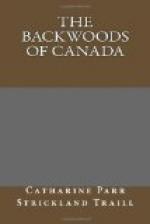About halfway between Cobourg and the Rice Lake there is a pretty valley between two steep hills. Here there is a good deal of cleared land and a tavern: the place is called “Cold Springs.” Who knows but some century or two hence this spot may become a fashionable place of resort to drink the waters. A Canadian Bath or Cheltenham may spring up where now Nature revels in her wilderness of forest trees.
We now ascended the plains—a fine elevation of land—for many miles scantily clothed with oaks, and here and there bushy pines, with other trees and shrubs. The soil is in some places sandy, but varies, I am told, considerably in different parts, and is covered in large tracks with rich herbage, affording abundance of the finest pasture for cattle. A number of exquisite flowers and shrubs adorn these plains, which rival any garden in beauty during the spring and summer months. Many of these plants are peculiar to the plains, and are rarely met with in any other situation. The trees, too, though inferior in size to those in the forests, are more picturesque, growing in groups or singly, at considerable intervals, giving a sort of park-like appearance to this portion of the country. The prevailing opinion seems to be, that the plains laid out in grazing or dairy farms would answer the purpose of settlers well; as there is plenty of land that will grow wheat and other corn-crops, and can be improved at a small expense, besides abundance of natural pasture for cattle. One great advantage seems to be, that the plough can be introduced directly, and the labour of preparing the ground is necessarily much less than where it is wholly covered with wood.
[Illustration: Rice Grounds]
There are several settlers on these plains possessing considerable farms. The situation, I should think, must be healthy and agreeable, from the elevation and dryness of the land, and the pleasant prospect they command of the country below them, especially where the Rice Lake, with its various islands and picturesque shores, is visible. The ground itself is pleasingly broken into hill and valley, sometimes gently sloping, at other times abrupt and almost precipitous.
An American farmer, who formed one of our party at breakfast the following morning, told me that these plains were formerly famous hunting grounds of the Indians, who, to prevent the growth of the timbers, burned them year after year; this, in process of time, destroyed the young trees, so as to prevent them again from accumulating to the extent they formerly did. Sufficient only was left to form coverts; for the deer resort hither in great herds for the sake of a peculiar tall sort of grass with which these plains abound, called deer-grass, on which they become exceedingly fat at certain seasons of the year.




